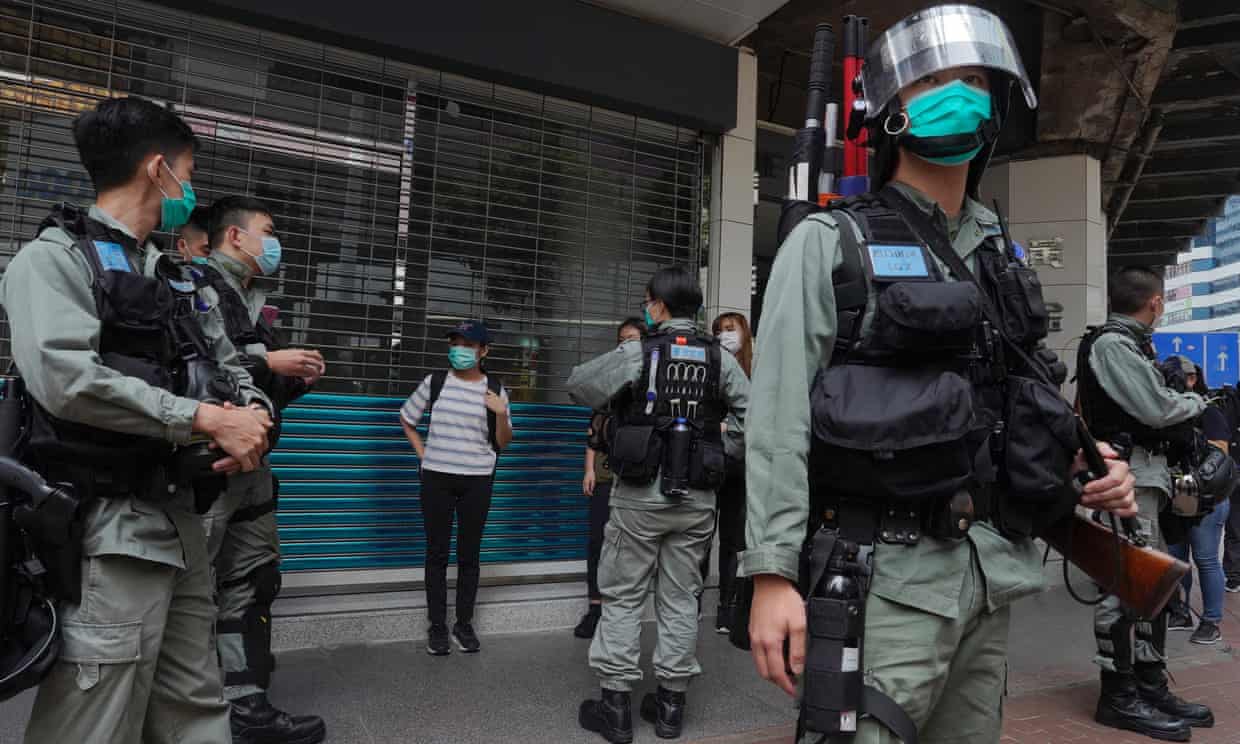Hong Kong
Hong Kong crisis: at least 360 arrested as China protests grow
Riot police flood city as pro-democracy groups protest against law criminalising ‘ridicule’ of Chinese anthem
by Verna Yu, Helen DavidsonHong Kong police arrested at least 360 people during day-long protests and skirmishes across the city, as residents railed against controversial legislation aimed at bringing the territory further under Beijing’s control.
Police fired pepper-spray bullets into lunchtime crowds as people shouted slogans. Officers stopped and searched residents, including students, and rounded up suspected protesters, forcing them to sit in rows on the ground.
Thousands of armed police had flooded the streets to stop the planned demonstrations aimed at halting a law criminalising ridicule of China’s national anthem. The protests have been given a fresh urgency with Beijing announcing last week plans to force a sweeping anti-sedition law on Hong Kong, where similar legislation was shelved after it caused mass protests in 2003.
The National People’s Congress, China’s rubber-stamp parliament, is expected to approve the plan on Thursday, bypassing Hong Kong’s own legislature.
Protesters occupied the roads in Mongkok into the night after a day of protests and clashes. Police said that as of 9.30pm, over 360 people had been arrested for offences including unauthorised assembly and possession of objects such as petrol bombs.
Earlier in the day, police in riot gear stopped and searched mainly young people outside Hong Kong’s MTR railway stations during morning rush hour and lined walkways as commuters shuffled past, prompting accusations on social media that the city had become “a police state”.
Roads around the Legislative Council building (LegCo) were blocked off as lawmakers held a debate on the anthem law..
Protest organisers on social media urged people to “be water” and keep moving throughout the city, but acknowledged it would be difficult to stop the anthem debate without high risk of arrest. “But you can at least make a statement,” said one post.
Crowds regrouped from lunchtime. Schoolchildren were among those detained in Mongkok, while at least 180 were arrested in Causeway Bay for an unauthorised gatherings and protesters repeatedly charged at in Central and fired at with pepper-spray rounds.
Police accused protesters of setting fire to debris and throwing objects at officers. “Police had no other option and needed to employ minimal force, including pepper balls to prevent the relevant illegal and violent behaviour,” the force said.
The crowds remained, swearing at police and chanting: “Hong Kong independence, it’s the only way.”
“I’ve come for something I care deeply about – ultimately it’s freedom,” said a 40-year-old lawyer who wished to remain anonymous, citing the national security laws, Beijing encroachment, and a recent report clearing police of wrongdoing. “If we keep quiet, they can get away with it. I don’t think we can change things but need to make sure our voices are heard.”
Crowds led by the former legislator Leung Kwok-hung gathered at Admiralty station, near LegCo, were told by police to leave or they would be prosecuted. Protesters shouted back at police to “be Hongkongers”.
“Of course I need to make my voice heard. They’re forcing this upon us and we can’t fight against them,” said Mrs Lam, 74.
A 73-year-old woman who gave the surname Cheung said she swam to Hong Kong from China to “escape the dictatorial rule of the CCP [Chinese Communist party]” when she was 15. “The Communist party is not trustworthy,” she said. “When they say you’re guilty then you’re guilty. Is there still ‘one country, two systems’? Of course we need to fight.”
A district councillor, Roy Tam, said police had pointed pepper-spray at him. “Police use force to intimidate people to disperse gatherings,” he said. “Freedom of assembly has gone.”
Several days have been set aside in the Hong Kong legislature for debate on the anthem law and the vote is scheduled for 4 June – the anniversary of the Tiananmen Square massacre and another source of controversy given Hong Kong’s vigil this year will not be allowed.
Opponents say the anthem law could be weaponised against pro-democracy activists and legislators since “intent to insult” the anthem, such as by changing lyrics or music or singing in a “disrespectful way”, carries financial penalties and jail of up to three years.

Booing of the March of the Volunteers, the national anthem of the People’s Republic of China, as well as Hong Kong and Macau, at Hong Kong football marches has previously embarrassed Beijing.
Macau enacted an anthem law in January 2019, but Hong Kong’s stalled amid political gridlock which later descended to violence. The government has denied the bill would suppress freedom of speech, and said an offence would occur only if someone expressed their views by publicly and intentionally insulted the national anthem.
Hong Kong media on Wednesday alsl reported that Beijing had expanded the scope of the draft security law legislation to target organisations as well as individuals, according to the public broadcaster RTHK and the South China Morning Post.
The proposed law has attracted criticism from across the world. The US secretary of state, Mike Pompeo, on Wednesday set the stage for the US to withdraw Hong Kong’s preferential trade and financial status as he notified Congress that the Trump administration no longer regards it as autonomous from mainland China. The EU has said China must respect Hong Kong’s autonomy.
Taiwan’s president, Tsai Ing-wen, has said her government would come up with measures to help Hong Kong residents, fearing for their safety under the new law, relocate to Taiwan.
A Chinese foreign ministry spokesman, Zhao Lijian, said on Wednesday afternoon that his country would take “all necessary countermeasures” against foreign interference.
The commander of the People’s Liberation Army garrison in Hong Kong said earlier this week his troops – estimated to number around 10,000 – stood ready to “safeguard” Chinese sovereignty and support national security laws.